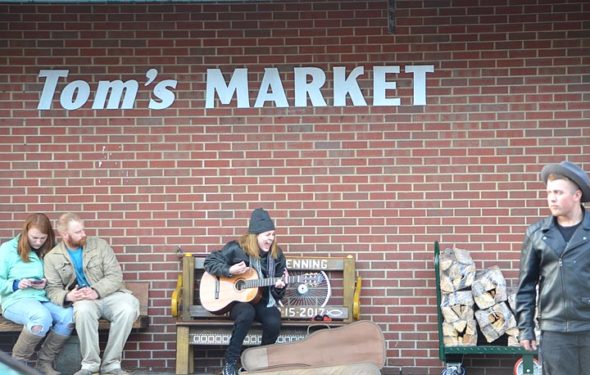
During a busy and beautiful holiday weekend in 2018, a street busker entertained holiday shoppers while villagers went about their regular business. (News archive photo by Megan Bachman)
Village Council votes down busking rules
- Published: November 16, 2022
At its regular meeting on Monday, Nov. 7, Village Council voted down an ordinance that would have added regulations for buskers and street performers in the village.
The ordinance was part of an ongoing discussion about noise in the downtown business district, but its opponents said portions of it, including a $15 fee for a performance permit and a ban on amplified sound, unfairly targeted low-income performers and those who could only perform with some amplification.
Council President Brian Housh began the discussion by having the resolution number read, saying that he had been reading the Yellow Springs Charter, which says that Council members should explicitly state when a piece of legislation will not be read in full.
After reading the title of the legislation, Housh gave the floor to Village Manager Josué Salmerón, who said the legislation was a way to address the issue some business owners have with amplified sound.
“I saw this piece of legislation as Council being responsive,” Salmerón said.
Housh said that he felt the legislation encompassed the needs of downtown business owners, patrons and buskers. He said that he appreciated the work the Public Arts and Culture Commission had done on busking, but that he didn’t remember Council asking the commission for input.
During the public hearing, several villagers asked Council to reconsider the legislation; no villagers spoke in favor of the legislation.
Will Cook, a downtown resident and musician, said the the legislation was “discriminatory to anyone who plays an instrument other than an acoustic guitar.”
“The main issue people are having is that people are upset with bars having loud music that is amplified at night,” Cook said. “That’s already been handled by the noise ordinance.”
Cook also took issue with the permitting process, which he called “pointless.”
“The permitting was not one of the recommendations [from the Public Arts and Culture Commission],” Cook said. “It’s an extra cost and a waste of time and resources.”
Cook also described the permitting and taxing process as “picking on the little guy.”
“On a great day, I might make $70,” Cook said. “I don’t think our village, as a whole, supports this ordinance.”
Villager and busker Teresa Monée “Misty” Gill said she uses amplification at a level that is much lower than some performers who are not amplifying their sound.
“I only amplify to play my music and to sing,” she said, suggesting that she would not be able to busk if the amplification portion of the legislation passed.
Gyamfi Gyamerah said that he believed the spirit of the legislation was punitive towards people with “talent.”
“This proposal has no diversity, equity and inclusion, which cuts against all the Village says they stand for,” Gyamerah said. “This ordinance is a small group of people being represented and trying to make decisions for people who have talent and can play. The music can’t be stopped.”
Speaking on her own behalf, Amy Wamsley, president of the Public Arts and Culture Commission, cited legislation passed in 2012 that she says encouraged the artistic endeavors of residents of all ages and ability levels.
“You are violating your own policies by not adjusting something that is already in existence,” Wamsley said, asking that the Public Arts and Culture Commission be given time to adjust the performance agreement cards.
Laura Curliss also spoke against the legislation, describing the legislation as “fixing something that wasn’t a problem.”
“We have tried to decriminalize these nuisance kinds of things; I’m bothered that this could [be escalated to] a misdemeanor. That’s not something you have said you want to do in terms of equity.”
Council member comments echoed several of the sentiments shared by citizens. Both Gavin DeVore Leonard and Carmen Brown said the ordinance seemed far-reaching, with DeVore Leonard calling the legislation “onerous,” and Brown calling it similar to legislation in communities that were more “conservative leaning.”
“We are supposed to be a progressive and welcoming community,” Brown said. “This is the antithesis of that.”
Council Vice President Kevin Stokes and member Marianne MacQueen both said they would like more time to consider the needs of buskers, who, Stokes said, were not consulted.
“I think we should reconsider, given there is no time crunch,” Stokes said. “Let’s complete the process.”
Housh said he didn’t think there was a need to table the item, and that Council members should consider the needs of all villagers when casting their vote.
“We have a responsibility to the village beyond our own preferences,” Housh said.
Housh asked Police Chief Paige Burge whether the current busking guidelines are enforceable, to which she replied that there was no lawful reason for officers to ask buskers to move. Housh said he believed the ordinance would not increase negative interactions between police officers and buskers.
“[We are] blowing this out of proportion,” he said before calling the vote.
The motion failed 4–1, with Housh casting the only “yes” vote.
The Yellow Springs News encourages respectful discussion of this article.
You must login to post a comment.
Don't have a login? Register for a free YSNews.com account.










No comments yet for this article.